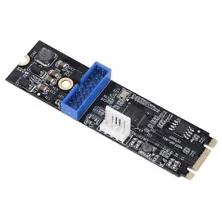@TheVault I went in and enabled IOMMU directly, with no change. I’ve been in and out the the bios so many times and tried so many different configurations.
@SuperDodge I seem to be able to pass 4X cards through using the top slot but ONLY when in 4x4x4x4x mode, not in 16x mode. So for instance, one can pass through a 1x or 4x USB card in the top slot in bifurcation mode, but not a 16x graphics card in 16x mode (Also, don’t try a 16x card in 4x mode, It is not happy about that).
What I finally resorted to was using my storage NVME 4x4x4x4x card in the top slot so I never have to worry about doing passthrough on that specific slot.
Other recommendations:
I would recommend manually setting the link speed on each one of the slots you intend to use. Manually set PCIE 3.0 when you don’t need PCIE 4.0 and so on. (That was the source of a lot of my dmesg pcie errors that muddy the waters more.)
If you want to do a USB 3 passthrough, but don’t want to take up a full PCIE slot, I picked up one of these off of ebay.

It’s a USB controller on an M.2 form factor. It requires some guest OS loading of drivers: Rensas USB 3.0 cards VFIO Passthrough possible fix through firmware upgrade (Read the recent posts) but it works really well to convert the top M.2 slot into a easy pass-through USB controller.
I have had the worst headaches trying to pass-through the USB controllers on the mobo. It works, but, then after a VM reboot, it sometimes doesn’t. If you’ve found a way to make that easier, please post a link.
Finally, I made a video on programatically pinning virtual machine to specific CPU cores which you may find helpful. Virtual Machine CPU Pinning using Proxmox - YouTube